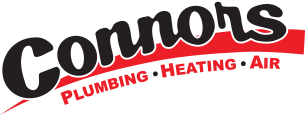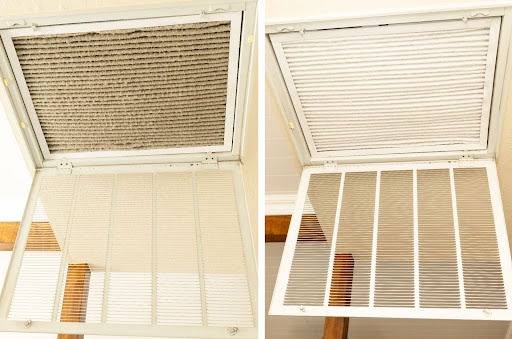As the seasons change and you prepare to switch from cooling to heating, making sure your HVAC system is in good shape is essential for your comfort and your wallet. An often overlooked yet crucial component of this transition is changing your air filter.
At Connors Plumbing, Heating and Air, we know that a clean air filter can significantly impact your indoor air quality, system performance, and overall energy costs. What’s the importance of regular filter replacements? And how can they benefit your home?
Why Air Filters Matter in Your HVAC System
Air filters serve as the first line of defense in maintaining good indoor air quality, which helps your HVAC unit operate at peak efficiency. A clean air filter works by trapping dust, allergens, and other particles before they have a chance to enter the furnace, which is the part of your HVAC system that circulates air through your home.
Conversely, a dirty air filter can lead to a myriad of issues, which include compromised air quality and reduced system efficiency.
The Consequences of Dirty Air Filters
When air filters are not changed regularly, they can become clogged with debris. This not only strains your heating and cooling system but also impacts its ability to heat or cool your home effectively.
A dirty or clogged air filter makes it harder for your system to pull air in, increasing energy costs as your unit works harder to achieve your desired temperature setting. Over time, this extra strain can lead to more frequent HVAC repairs and even premature system failure.
For these reasons, it’s generally a good practice to change your HVAC filters as you transition from cooling to heating (and vice versa). Doing so not only ensures that your system is prepared to handle the specific challenges of the upcoming season but also helps maintain good indoor air quality and system efficiency.
How Changing Your Air Filters Can Save Money
One of the most compelling reasons to change your air filter regularly is the potential savings on energy bills. With a clean air filter, your HVAC system doesn’t have to labor unnecessarily to heat or cool your home, thus improving energy efficiency. This straightforward maintenance task can lead to noticeable reductions in energy costs, helping you save money each month.
Knowing When to Change Your Air Filter
The frequency at which you should change your air filter can vary depending on several factors, including:
- The size of your home
- Whether you have pets
- Whether you have allergies
- Manufacturer recommendations
Generally, we recommend changing your air filter every 30 to 90 days. However, if you’re running your HVAC system all day long or if you have pets, you may need to change your filter more frequently because it directly influences your home’s air quality.
Regularly changing your air filter is a simple yet effective way to improve home air quality, reducing the amount of allergens and irritants that contribute to respiratory issues and other health problems. It’s especially important as you switch from using the air conditioner to the heating system — because a clean air filter will set you up for comfort during the colder months.
The size of your home also plays a role in how quickly filters become clogged. Larger homes with more square footage may require more frequent changes due to the volume of air being processed. Additionally, factors like smoking indoors can greatly decrease air quality, requiring more frequent filter changes to manage the accumulation of particulates.
Manufacturer recommendations should also guide your maintenance schedule; adhering to these guidelines not only helps maintain air quality but also improves energy efficiency by ensuring your system is not overworking due to a clogged filter.
Identifying an Air Filter That Needs to Be Changed
When inspecting your filter, look for visible signs of dirt, dust accumulation, and any damage to the filter material. A filter that appears darkened or clogged is a clear indicator that it needs to be replaced.
If you notice an increase in dust around your home or a decrease in airflow, these can also be signs that your filter is impeding your system’s ability to push air effectively. By checking your filter monthly, you can make informed decisions about when it needs to be changed and keep your system ready for transitions from cooling to heating and vice versa.
MERV Ratings and the Frequency of Filter Changes
In addition to these considerations, the type of filter and its Minimum Efficiency Reporting Value (MERV) are crucial in determining how often you should change your filter. Filters with higher MERV ratings trap finer particles, which can clog more quickly under heavy use, affecting your air conditioning system’s ability to push air efficiently. This can increase energy consumption as your system works harder to circulate air.
Our Recommended HVAC Maintenance Checklist
Routine maintenance, including air filter changes, should be part of your seasonal preparations for your HVAC system. Our HVAC maintenance checklist includes:
- Checking and replacing air filters
- Inspecting your HVAC unit for any potential issues
- Cleaning the outdoor unit
- Checking for air leaks in your system
- Scheduling professional HVAC maintenance
These steps not only ensure your system’s efficiency but also extend its lifespan!
Ready for a Filter Change? Contact Connors Plumbing & Heating Today!
As the seasons change, so should your approach to HVAC maintenance. At Connors Plumbing, Heating and Air, we’re dedicated to helping our Waseca, MN, community enjoy a comfortable and efficient home.
If you’re ready to improve your system’s efficiency, save money, and breathe cleaner air, don’t hesitate to contact us for your HVAC needs. We offer plumbing, air conditioning, and heating services to prepare your home for any season!

